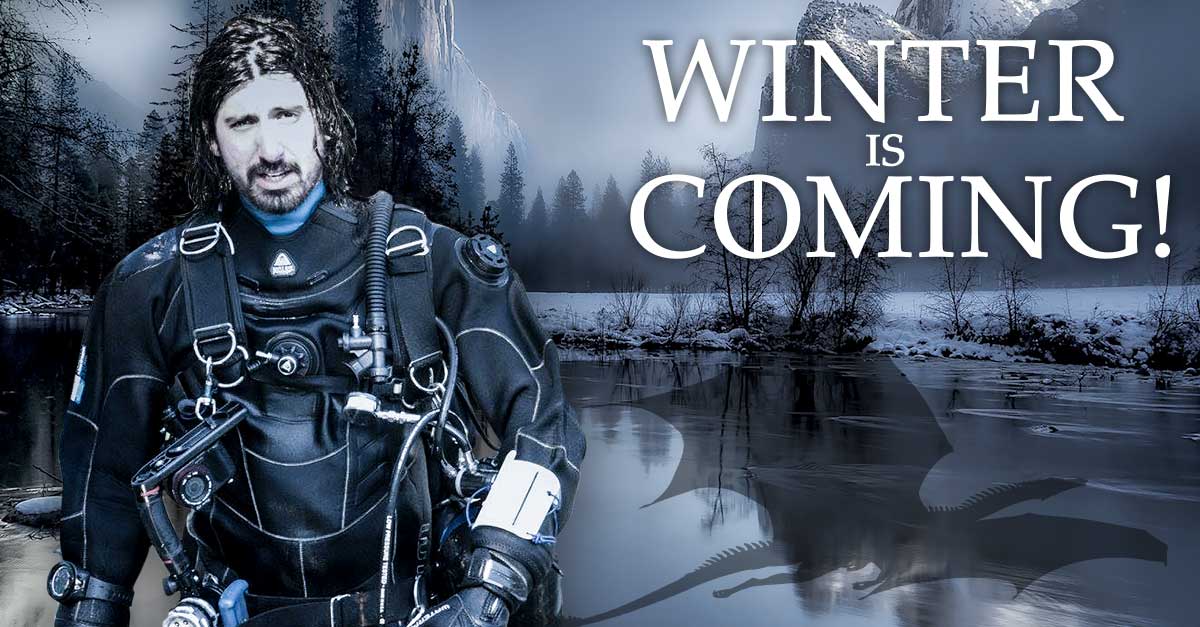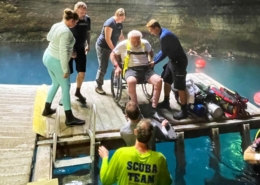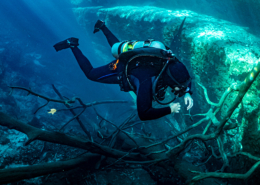Winter is Coming: Staying Warm While Diving in Winter
By Gemma Smith
Winter is indeed coming. There is no denying it, as much as we all may like to. People used to joke to me that if I went to live on the sun itself I’d STILL be cold. Yes, I am *that* person, who even in the height of summer always wears big woolly jumpers and doubles up on their socks. I am a self-confessed temperature wimp. More of a sunny Kings Landing girl than a Winterfell native. Nothing makes me miserable like being cold does. There is only one tiny problem with all of this. I am obsessed with cold water diving locations. Yes, warm water and sunshine is all well and good, but can anything compare to a perfectly preserved shipwreck lying in the 2-degree water that has helped ensure it stays pristine? Or traveling around Scandinavia having to clear away the snow that will allow you to reach your dive site? Or perhaps just keeping your skills fresh and sharp over this winter, practising in your local dive spot throughout the holiday season? I think not. Over the years I have learned, through trial and error, the best ways to stay warm when diving. With the inevitable onslaught of the colder weather ‘North of the Wall’ coming to us, here are my top five pieces of advice for my fellow temperature-challenged buddies:
Dry is the way forward
If at all possible, consider going down the drysuit route. Yes, its one more course to take, and more expense, but I truly believe its one of the best diving decisions I have ever made. As someone who learned to dive in February, in the UK, in a wetsuit, I speak from experience. I loved diving, but I was thermostatically miserable. As soon as I went down the drysuit route my diving suddenly all made sense. I was so much more comfortable, and therefore happier and more enthusiastic. No one gets into this sport to be miserable after all. If you just don’t want to go down the drysuit avenue, get yourself a proper semi-dry wetsuit. Make sure it fits you properly, is an appropriate thickness for the water temperature you will be diving in, and if at all feasible make sure you layer up.
Don’t forget the extremities!!
Yes, perhaps not the most glamorous look in the world, but always wear a hood. A bad hair day afterward is a trivial price to pay for a good, safe, and thermally comfortable dive. Humans lose a surprising amount of body heat through their heads. It is so important to limit this as much as possible. A proper 5mm-7mm neoprene hood is an easy way to maximise winter diving fun. As for the hands, a good pair of 5mm gloves at the very least is a must. And for those diving drysuit, drygloves are an absolute gift! Not only are cold hands not at all pleasant, but they will lose dexterity and possibly interfere with your ability to do basic tasks underwater. Definitely not something the safe and conscientious diver wants.
Consider your Surface Interval
While one dive in even the coldest water is great, it is the hanging around on the surface waiting for dive two that can really spoil your day. Especially for those of you diving wetsuit, it is so important to get out of it, get dried off, get changed into warm, dry, fresh clothes, and let your body’s temperature return to normal. Even if you plan on doing a second dive, ensure you always get out of wet gear. Cold water combined with a cold surface temperature and possible wind chill all added together is not going to do anyone any favours. Your surface interval is your chance to regain your energy. Make sure you do all you can to give yourself the best chance for a fantastic second dive. Beginning a dive already chilly is a big no-no. Get thermally comfortable in between submersions.
Think of what goes into your body
While eating properly and staying hydrated is always important, it becomes even more so when diving in colder conditions. Your body will burn yet more calories than normal while trying to maintain and generate heat for you. Make sure you fuel yourself properly for your day of diving. Hot drinks throughout the day and a warm, slow-releasing carbohydrate meal before a dive will do wonders. Believe me, your body will thank you if you do.
If in doubt, call the dive
No one gets a prize for sticking it out until the end of the dive if you aren’t enjoying yourself. That isn’t what this sport is about. If you start shivering uncontrollably, either before or during a dive, call it. Simple as that. Never feel bad about ‘ruining’ or shortening your buddy’s dive. Chances are if you are getting cold, they are too. There is always another day, and another dive, to experience. Uncontrollable shivering is a worrying sign of hypothermia. This can cause all kinds of issues, both physical, mental, and specifically diving related. Don’t put yourself, or your dive buddies, in that position. I’ve called plenty of dives in the past for a whole array of reasons. I don’t regret a single one of those missed dives. Listen to your body and your mind and act accordingly. That is what marks you out as the safe diver that you are.










Ответить
Хотите присоединиться к обсуждению?Не стесняйтесь вносить свой вклад!